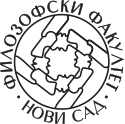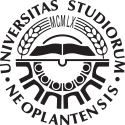15KKKK19 - Modern Poetics
| Course specification | ||||
|---|---|---|---|---|
| Course title | Modern Poetics | |||
| Acronym | 15KKKK19 | |||
| Study programme | Comparative Literature with Literature Theory | |||
| Module | ||||
| Type of study | first degree undergraduate academic studies | |||
| Lecturer (for classes) | ||||
| Lecturer/Associate (for practice) | ||||
| Lecturer/Associate (for OTC) | ||||
| ESPB | 6.0 | Status | ||
| Condition | Passed exam in Normative Poetics | Oblik uslovljenosti | ||
| The goal | Interpretation and explication of the concepts of modern poetics from the (Pre)romanticism to the contemporary poetics. | |||
| The outcome | Students ought to learn the basic principles of antinormative poetics in a diachronic and comparative context, as well as their theoretical and interpretative application. They are enabled to determine and interpret on their own relations between the autopoietic texts and manifests, on the one side, and the very lyric, prose, or dramatic writings of a particular author, on the other one. | |||
| Contents | ||||
| Contents of lectures | Textual analysis, determining of the focus, key concepts, innovations, and revisions: Friedrich Schiller, Johan Wolfgang von Goethe, Victor Hugo, Edgar Allan Poe, Honoré de Balzac, Emile Zola, Charles Baudelaire, Arthur Rimbaud, Stefan Mallarmé, Filippo Tommaso Marinetti, Kasimir Edschmid, André Breton, Thomas Stearns Eliot, Virginia Woolf, Thomas Mann. | |||
| Contents of exercises | Practices, presentations, study research work | |||
| Literature | ||||
| ||||
| Number of hours per week during the semester/trimester/year | ||||
| Lectures | Exercises | OTC | Study and Research | Other classes |
| 2 | 1 | |||
| Methods of teaching | Text analysis, monologic method, dialogic method, interactive method, intermedial approach and presentations, consultations. | |||
| Knowledge score (maximum points 100) | ||||
| Pre obligations | Points | Final exam | Points | |
| Activites during lectures | 20 | Test paper | ||
| Practical lessons | 10 | Oral examination | 70 | |
| Projects | ||||
| Colloquia | ||||
| Seminars | ||||

